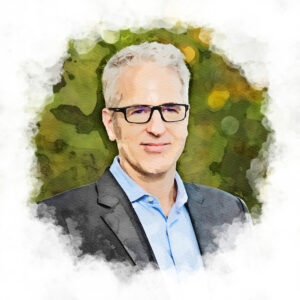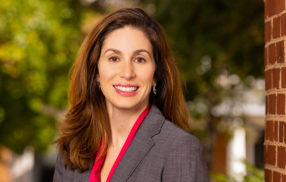
New UVA Darden Professors Spotlight What’s Trending
By Molly Mitchell
One of the perks of boasting the best B-school faculty in the world is access to those on the forefront of emerging business frontiers or industries undergoing massive change. The influx of new faculty members at Darden in recent years, including 12 new professors who joined for the 2022–23 academic year, helps the Darden community stay on the leading edge of all things new and next, from machine learning to allyship in the workplace.
Some of Darden’s newest professors offer their insights on the biggest and most exciting developments in their respective fields, and what discerning observers should keep an eye on in the near future.

Les Alexander, John Glynn Endowed Professor in Venture Capital
Dry Powder on Deck in Venture Capital
Les Alexander, John Glynn Endowed Professor in Venture Capital
Les Alexander focuses on the Finance and Strategy, Ethics & Entrepreneurship areas at Darden. He is an experienced professor, venture capital and private equity investor, corporate executive, and investment banker.
The venture capital industry grows and evolves much like the entrepreneurial companies it supports. Limited partners continue to inject billions of dollars into funds seeking above-market returns, and the industry delivered a more than 50 percent rate of return in 2021.
With strong returns comes more capital. VCs are now sitting on $290 billion in dry powder to invest in disruptive and growing businesses. Although the record highs from prior periods were not likely repeated in 2022, the overall VC industry generally remains active in terms of fundraising and deployment.
Challenges exist in the venture capital space, too. Declining public market valuations, particularly in the technology industry, have reduced valuations for VC portfolio companies. Dealmakers are more disciplined in the current recessionary environment and are more reluctant to assign sky-high valuations.
While the traditional regions of San Francisco, Boston and New York remain active hubs for venture capital, other cities such as Seattle, Austin, Denver, Miami and Washington, D.C., are seeing meaningful investment into early and later-stage private companies in their respective communities. Increases in deal activity in these markets improves access to capital for many businesses across the country.

Darden Professor Allison Elias
How Shifting Workplace Norms Impact Women and Leadership
Allison Elias, Assistant Professor of Business Administration
Allison Elias teaches courses about communication and negotiation in Darden’s MBA and Executive MBA programs. Her research investigates historical and contemporary issues of gender and diversity in organizations.
Women in leadership potentially stand to benefit from some of the lasting effects of COVID-19 on the workplace. There is greater attention to recruiting, developing and retaining talented employees, which means that the pendulum has shifted toward the worker, so to speak, as firms fiercely compete for talent. Concerns that used to be labeled “women’s issues” — flexible working arrangements and integrating family life with professional life — now imbue C-suite discussions about the employee experience.
Darden students and alumni of all genders can avail themselves of this moment to find the job, company and industry that best align with their own values and strengths so that they can thrive personally and professionally.
While overwork norms and tournament-like atmospheres still define the highest-paid industries (industries that have historically been dominated by men), Darden students have an unprecedented opportunity to ask themselves, “What does a good life mean to me?” Perhaps the pursuit of a traditional promotional track in an established industry is what is right; others may forge their own path instead or even use experience in an established industry to pivot in the future. The possibilities are both a blessing and a curse as many try to clarify their priorities and make choices that align with their values.

Darden Professor Lauren Kaufmann
The Politicization of ‘Responsible’ Investing
Lauren Kaufmann, Assistant Professor of Business Administration
Lauren Kaufmann teaches First Year Ethics in Darden’s MBA program. She uses normative and empirical methods in her research on business ethics, social impact and impact investing.
Responsible investing is big business. In both public and private markets, considering environmental and social outcomes and risks has become one of the latest hot-button issues in the financial sector. The traditional narrative of business as amoral and politically neutral is being tested, and appropriately so. Nothing about how we conduct business, invest our money or transact in markets can be explained without values. It’s ethics all the way down.
Practitioners in the rapidly growing environmental, social and governance (ESG) and impact investing movements, which now capture over one-third of global assets under management, are seeing their attempts at making the world more sustain- able debated as partisan politics and as competition for rival investment vehicles that claim to “counter the liberal agenda.”
As a business ethicist, I am fascinated to see how values drive the public debate about the role of business in society. In my research on gender in labor markets and on impact investing, I show how values fundamentally influence business activity. I expect the public and political conversation around ESG and impact investing to continue, and I will be watching closely to see how values play a role in what we consider what is — and is not — sustainable in the world of business.

Darden Professor Melanie Prengler
Effective Allyship
Melanie Prengler, Assistant Professor of Business Administration
Melanie Prengler’s research focuses on employees at the leading edge of two trends in organizations: how employees can reduce systemic discrimination in their organizations via allyship and antiracism, and how employees in remote work arrangements create a sense of workplace out of nonwork space.
What does it take to be a good ally in the workplace? Until recently, scholars and managers assumed that one simply had to try. Consequently, most allyship research has been centered around motivating managers to engage in allyship and identifying the repertoire of allyship behaviors available to them.
I believe the most exciting trend in allyship research is the shift toward unpacking complex answers to more targeted questions. When are certain allyship behaviors helpful versus harmful? What are the consequences of failed allyship on marginalized employees? How can would-be allies recover well from a failure?
In essence, we are beginning to understand that to advance diversity, equity and inclusion in the workplace, it is not enough to try. We must understand how to engage in allyship effectively.

Darden Professor Eric Siegel
Fulfilling the Promise of Machine Learning
Eric Siegel, Bodily Bicentennial Professor in Analytics
Visiting Professor Eric Siegel is a leading consultant and former Columbia University professor who focuses on machine learning. He is the founder of the Predictive Analytics World and Deep Learning World conference series, executive editor of The Machine Learning Times and author of the bestselling book Predictive Analytics: The Power to Predict Who Will Click, Buy, Lie, or Die.
When it comes to machine learning projects, there’s a great opportunity to improve. Currently, the overall track record of this highly visible technology is compromised: the realized value doesn’t match the excitement…yet. And that misalignment spells opportunity.
Machine learning’s popularity exploded because of its great potential business value and sheer scientific clout — learning from data to predict impresses the best of us. The praise is not all empty hype, but surveys show a stark reality: most machine learning projects fail to deploy. The number-crunching part is solid, but using it to improve operations turns out to be a greater change-management challenge than most foresee.
Those who proactively address this dilemma by adopting a collaborative, end-to- end management practice will be ahead of the curve. They will empower their organizations to overcome impediments so that the fruits of their data scientists’ labor come to fruition. As Darden’s inaugural Bodily Bicentennial Professor in Analytics, I am spending this one-year appointment developing guidance and curricula to help future graduates run machine learning projects that successfully deploy.
The University of Virginia Darden School of Business prepares responsible global leaders through unparalleled transformational learning experiences. Darden’s graduate degree programs (MBA, MSBA and Ph.D.) and Executive Education & Lifelong Learning programs offered by the Darden School Foundation set the stage for a lifetime of career advancement and impact. Darden’s top-ranked faculty, renowned for teaching excellence, inspires and shapes modern business leadership worldwide through research, thought leadership and business publishing. Darden has Grounds in Charlottesville, Virginia, and the Washington, D.C., area and a global community that includes 18,000 alumni in 90 countries. Darden was established in 1955 at the University of Virginia, a top public university founded by Thomas Jefferson in 1819 in Charlottesville, Virginia.
Press Contact
Molly Mitchell
Senior Associate Director, Editorial and Media Relations
Darden School of Business
University of Virginia
MitchellM@darden.virginia.edu







